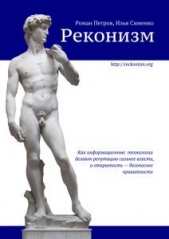Реконизм. Как информационные технологии делают репутацию сильнее власти, а открытость — безопаснее п

Реконизм. Как информационные технологии делают репутацию сильнее власти, а открытость — безопаснее п читать книгу онлайн
Эта книга — о влиянии информационных технологий на социальную эволюцию. В ней показано, как современные компьютеры и Интернет делают возможным переход к новой общественной формации, в основе которой будут лежать взаимная прозрачность, репутация и децентрализованные методы принятия решений. В книге рассмотрены проблемы, вызванные искажениями и ограничениями распространения информации в современном мире. Предложены способы решения этих проблем с помощью распределённых компьютерных систем. Приведены примеры того, как развитие технологий уменьшает асимметричность информации и влияет на общественные институты, экономику и культуру.
Внимание! Книга может содержать контент только для совершеннолетних. Для несовершеннолетних чтение данного контента СТРОГО ЗАПРЕЩЕНО! Если в книге присутствует наличие пропаганды ЛГБТ и другого, запрещенного контента - просьба написать на почту [email protected] для удаления материала
49. Orwell, George. Nineteen Eighty-Four. London: Penguin, 1954.
50. Brin, David. The Transparent Society: Will Technology Force Us to Choose between Privacy and Freedom? Reading, MA: Addison-Wesley, 1998.
51. Arrow, K. J. "Uncertainty And The Welfare Economics Of Medical Care" Journal of Health Politics, Policy and Law 26.5 (2001): 851-83.
52. Akerlof, George A. "The Market for "Lemons": Quality Uncertainty and the Market Mechanism" The Quarterly Journal of Economics 84.3 (Aug., 1970): 488-500.
53. Spence, Andrew Michael. Market Signaling: Informational Transfer in Hiring and Related Screening Processes. Cambridge, MA: Harvard Univ. Pr., 1974.
54. Spence, Andrew Michael. "Job Market Signaling" The Quarterly Journal of Economics 87.3 (Aug., 1973): 355-74.
55. Mancini, Anna. Copyright Law Is Obsolete. Dover, DE: Buenos America, 2006.
56. Arthur, Robert R. You Will Die: The Burden of Modern Taboos. Washington, D.C.: Suburra, 2008.
57. Peters, Iva Lowther. The Institutionalized Sex Taboo,. New York, 1921.
58. Global Commission on Drug Policy | Report. Global Commission on Drug Policy. Global Commission on Drug Policy. Web. 10 Dec. 2011. http://www.globalcommissionondrugs.org/Report.
59. Audi, Robert. Business Ethics and Ethical Business. New York: Oxford UP, 2009
60. Bishop, Michael A., and Trout, J. D. Epistemology and the Psychology of Human Judgment. New York: Oxford UP, 2005
61. Serge Chakotin, Rape of the Masses: The Psychology of Totalitarian Political Propaganda (Studies in Philosophy), New-York, Haskell House Pub Ltd, 1971
62. "The Budget, Department of Defense" The White House. Web. http://www.whitehouse.gov/sites/default/files/omb/budget/fy2012/assets/defense.pdf
63. Mueller, John. "Hardly Existential: Terrorism As A Hazard To Human Life" Department of Political Science and Mershon Center Ohio State University http://polisci.osu.edu/faculty/jmueller/ISA10.PDF Prepared for Presentation at the Panel, "Theoretical Pitfalls and Policy Conundrums: Exploring Myths and Realities on Post-9/11 Terrorism and Counterterrorism" National Convention of the International Studies Association New Orleans, Louisiana, February 18, 2010 (February 3, 2010).
64. Платон. Собрание сочинений в четырех томах. Государство. Том. 3. Москва: Мысль, 1994. Философское наследие, т. 117.
65. Castells, Manuel ,The Collapse of Soviet Communism: A View from the Information Society, Los Angeles, Figueroa Press, 2003
66. Lorenz, Konrad. On Aggression. San Diego, CA: Harvest Book, 1963.
67. Халифман, И. А. Пароль скрещенных антенн. Москва: Детгиз, 1962.
68. Baker, B. W., Hill, E. P. Beaver (Castor Canadensis). Pages 288-310 in Wild Mammals of North America: Biology, Management, and Conservation. Second Edition. Vol. Pages 288-310. Baltimore, Maryland, USA: Johns Hopkins UP, 2003.
69. Heyne, Paul T. The Economic Way of Thinking. Chicago: Science Research Associates, 1973.
70. Акулов, В. Б., Рудаков, М. Н,. Теория организации. Петрозаводск: ПетрГУ, 2002.
71. Coase, R. H. "The Nature of the Firm" Economica 4.16 (1937).
72. Kotler, Philip, Caslione, John A. Chaotics: the Business of Managing and Marketing in the Age of Turbulence. New York: American Management Association, 2009.
73. Егер, Оскар. Всемирная история в четырех томах. Санкт-Петербург: Специальная Литература, 1997.
74. Gibbon, Edward, The Decline and Fall of the Roman Empire. New York: Harcourt, Brace, 1960.
75. Перельман Я. И. “Занимательная физика”, Москва, “Наука”, 1979
76. Манен, Бернар “Принципы представительского правления”, Издательство Европейского Университета в Санкт-Петербурге, 2007
77. Kitchen, Martin, The Cambridge Illustrated History of Germany:-Cambridge University Press 1996
78. Ambachtsheer, Keith P. Pension Revolution: a Solution to the Pensions Crisis. Hoboken, NJ: Wiley, 2007.
79. Johnsson, Richard. "Road Wear and the Kilometre Charge: A Computable General Equilibrium Analysis" Journal of Transport Economics and Policy 39.1 (2005): 53-74. Web. 12 Dec. 2011. http://www.jstor.org/stable/20053950.
80. Barker, Terry, Köhler, Jonathan. "Charging for Road Freight in the EU: Economic Implications of a Weigh-in-Motion Tax" Journal of Transport Economics and Policy 34.3 (2000): 311-31. Web. 12 Dec. 2011. http://www.jstor.org/stable/20053849.
81. Directive 2011/62/EU of the European Parliament And of the Council of 8 June 2011 Amending Directive 2001/83/EC on the Community Code Relating to Medicinal Products for Human Use, as Regards the Prevention of the Entry into the Legal Supply Chain of Falsified Medicinal Products" Official Journal of the European Union (2011). European Commission. Europa, Strasbourg, July-Aug. 2011. Web. http://ec.europa.eu/health/files/eudralex/vol-1/dir_2011_62/dir_2011_62_en.pdf.
82. Ganascia, J.-G. "The Generalized Sousveillance Society" Social Science Information 49.3 (2010): 489-507.
83. Tapscott, Don, Williams, Anthony D. Wikinomics: How Mass Collaboration Changes Everything. New York: Portfolio, 2006.
84. Gibb, D. E. W. Lloyd's of London, a Study of Individualism. London: Macmillan, 1957.
85. DiRienzo, Cassandra E., Das, Jayoti, Cort, Kathryn T., Burbridge, John. Corruption and the Role of InformationJr Journal of International Business Studies Vol. 38, No. 2 (Mar., 2007), pp. 320-332 Published by: Palgrave Macmillan Journals Stable URL: http://www.jstor.org/stable/4540422
86. Пелевин, Виктор. «Ампир V» Москва, Эксмо, 2006.
87. Dhanjani, Nitesh, Rios, Billy, Hardin, Brett. Hacking. Sebastopol (CA): O'Reilly, 2009.
88. Белоглазова, Г. Н. Деньги, кредит, банки. Москва: Высшее образование, 2009.
89. Estonia. AS Sertifitseerimiskeskus ( www.sk.ee). The Estonian ID Card and Digital Signature Concept Principles and Solutions. Ver 20030307. http://www.id.ee. Web. 13 Dec. 2011. http://www.id.ee/public/The_Estonian_ID_Card_and_Digital_Signature_Concept.pdf.
90. Gilbert, Daniel Todd. Stumbling on Happiness. New York: A.A. Knopf, 2006.
91. Bauer, Friedrich Ludwig. Decrypted Secrets: Methods and Maxims of Cryptology. Berlin: Springer, 2000.
92. Pilato, C. Michael., Collins-Sussman, Ben, Fit, Brian W. Version Control with Subversion. Sebastopol, CA: O'Reilly & Associates, 2008.
93. Silversmith, David. "Google Losing up to $1.65M a Day on YouTube" Internet Evolution - The Macrosite for News, Analysis, and Opinion about the Future of the Internet. Internet Evolution, 2009. Web. 13 Dec. 2011. http://www.internetevolution.com/author.asp?section_id=715.
94. Torkington, Nat. "HBO Attacking BitTorrent - O'Reilly Radar" O'Reilly Radar - Insight, Analysis, and Research about Emerging Technologies. 4 Oct. 2005. Web. 13 Dec. 2011. http://radar.oreilly.com/archives/2005/10/hbo-attacking-bittorrent.html.
95. Nakamoto, Satoshi, Bitcoin: A Peer-to-Peer Electronic Cash System Web http://bitcoin.org/bitcoin.pdf 09.01.2012
























